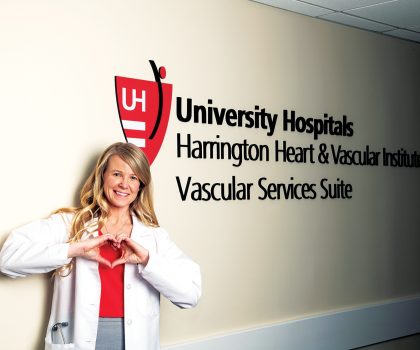Loving yourself means making heart-healthy choices to prevent heart attack and stroke

By Ken McEntee
Heart attack, stroke and other cardiovascular diseases are the leading cause of death in the United States, says Amanda Hall, a certified nurse practitioner at University Hospitals Harrington Heart & Vascular Institute at UH Geauga Medical Center. A healthy lifestyle, Amanda emphasizes, is the key to lowering your risk of heart related problems.
“Prevention is critical,” she says.
“The most prominent risk factors for cardiovascular disease all can be lowered by changes in lifestyle.”
Those risk factors are:
- Smoking
- Diabetes
- Diet
“Smoking increases the risk for most major diseases,” says Amanda. “Encouraging and helping patients to quit is one of the first things we do when we see them in the hospital. If they’ve already tried to quit 10 times, the 11th time could be the charm.”
Diabetes, Amanda says, shares many of the same risk factors associated with cardiovascular disease.
“Diabetes is a disease that attacks the small blood vessels,” she explains. “That can cause plaque buildup, which increases the risk for coronary artery disease.”
A healthy lifestyle—including plenty of exercise and a healthy diet—is vital for reducing the risks of diabetes and cardiovascular disease.
“Just because you have been diagnosed with diabetes doesn’t mean that your blood sugar has to be uncontrolled,” she says. “Weight loss, healthy eating and healthy living can help to control your diabetes.”
Healthy living includes at least 150 minutes of moderate level exercise, or at least 75 minutes of strenuous exercise each week, according to the American College of Cardiology.
“You don’t necessarily have to train for a marathon,” Amanda insists. “Moderate level exercise can be a fast-paced walk.”
When preparing your meals, she cautions, be careful of the fad diet of the month that promises incredible results.
“Many of these diets will work for a short period of time, but are not sustainable,” she says. “You might lose 10 to 15 pounds now, which is wonderful, but the goal is to keep the weight off and keep you healthy. That’s why it’s a good idea to discuss your diet with your doctor, and choose a plan that is right for you.”
Two highly recommended diets are the DASH (Dietary Approaches to Stop Hypertension) Diet—a low-sodium diet developed for the prevention or treatment of high blood pressure, or a similar Mediterranean-style diet based on traditional eating habits in the countries bordering the Mediterranean Sea. Both emphasize vegetables, fruits and whole grains, while limiting red and processed meats.
“We get a lot of questions about a vegan diet,” Amanda says. “More fruits and vegetables and less red meats and processed meats lowers the risk of high cholesterol, diabetes and cardiovascular disease. A vegan diet is not necessarily a recommendation of the American College of Cardiology and the American Heart Association at this time, but it is an option that some people may want to consider.”
You also may want to talk with your doctor about whether to take medication to control cholesterol. To help you decide, your doctor can do a 10-year risk calculator to estimate your chances of having a heart attack, stroke or other cardiovascular event.
Amanda also recommends an annual blood test—called a lipids panel—to test for your cholesterol level. She also recommends beginning calcium scoring testing at age 40, or earlier for people with high risk factors and/or family histories of cardiovascular disease.
University Hospitals Harrington Heart & Vascular Institute at UH Geauga Medical Center can help you keep your heart healthy. You can make an appointment by calling 440-901-6104. The UH Geauga Medical Center is located at 13207 Ravenna Road, in Chardon. You can learn more at UHHospitals.org/locations/uh-geauga-medical-center.
